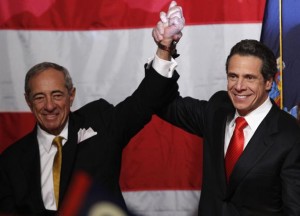Remembering William Greaves
Thursday, August 28th, 2014By Michael Kaufman
The penthouse suite at the Waldorf Astoria was crammed with sportswriters partaking of the open bar and sumptuous buffet provided by Jack Kent Cooke, multimillionaire owner of the Washington professional football team with a racial slur as its name. Cooke, who died in 1997, was about to announce plans for the biggest closed-circuit telecast yet to take place in the United States: the heavyweight championship fight between Joe Frazier and Muhammad Ali on March 8, 1971, at Madison Square Garden.
But before making the announcement and fielding questions he made sure the writers were well-oiled and well-fed.
Then he held court from a throne-like chair positioned above the assembled scribes. He listed the venues where the fight would be shown and said there would have been more sites if the equipment were available. The remaining details were of little interest and by the time he got around to matter-of-factly mentioning the price of tickets—well beyond what most people could comfortably afford—few were paying attention.
When he asked if anyone had any questions, one after another addressed him cordially as “J-a-a-a-ck” and lobbed a softball. I wanted to say something about the exorbitant cost of tickets but I couldn’t think of a way to put it in the form of a question. I also didn’t want to get his attention by cheerfully calling out his first name as if we were old chums. I’d never met the man and so far I didn’t like him any more than I liked George Weiss, the old-school baseball general manager who said of sportswriters, “You can buy them with a steak.” Nor did I think “Mr. Cooke” would be the appropriate form of address.
So I blurted, “Sir!”
Cooke nodded quizzically and I asked if it bothered him that the tickets were priced so high that most people wouldn’t be able to see the fight. I added something about the public demand being responsible for bringing it about in the first place.
“My name is Cooke, not Jesus Christ,” he replied, and I thought I’d made a fool of myself as he and some of the other writers enjoyed a laugh at my expense.
Later, as I was about to leave, a man walked up to me and shook my hand. He said he was making a documentary movie about Muhammad Ali and he’d like to have my permission to include my exchange with Cooke. I told him I thought I’d made a fool of myself but he said no, I’d livened things up a bit. So I signed a release for which William Greaves paid me the token sum of a dollar.
William Greaves died Monday at his home in Manhattan. He was 87. According to the Associated Press obituary, he leaves behind “a vast film archive of black art and culture” that includes hundreds of movies. “One of Greaves’ most widely seen productions was ‘Ali, the Fighter,’ a documentary about the 1971 championship fight between Muhammad Ali and Joe Frazier.” I am honored to be in it, albeit briefly, making a fool of myself or not as the case may be.
Michael can be reached at michael@zestoforange.com.






